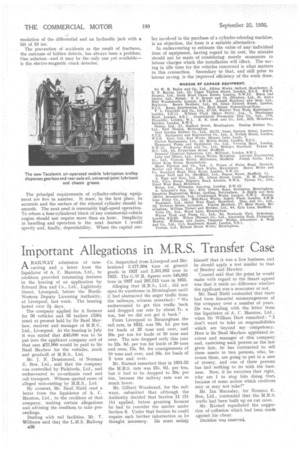Important Allegations in M.R.S. Transfer Case
Page 72

If you've noticed an error in this article please click here to report it so we can fix it.
ARAILWAY admission of ratecutting and a letter from the liquidator of A. C. Marston, Ltd., to creditors provided interesting features in the hearing of an application by Edward Box and Co., Ltd., Lightbody Street, Liverpool, before the NorthWestern Deputy Licensing Authority, at Liverpool, last week. The hearing
lasted over 31 days. , The company applied for A licences for 36 vehicles and 35 trailers (3304 tons) at present held by Sir Basil Mayhew, receiver and manager of M.R.S., Ltd., Liverpool. At the hearing in July it was stated that £45,000 was to be put into the applicant company and of that sum £33,900 would he paid to Sir Basil Mayhew for the vehicles, stock and goodwill of M.R.S., Ltd.
Mr. J. N. Drummond, of Norman E. Box, Ltd., said that the company was controlled by Pickfords, Ltd., and endeavoured to co-ordinate road and rail transport. Witness quoted cases of alleged rate-cutting by M.R.S., Ltd.
By consent, Mr. Basil Nield read a letter from the liquidator of A. C. Marston, Ltd., to the creditors of that company, making certain allegations and advising the creditors to take proceedings.
Dealing with rail facilities, Mr. T. Williams said that the L.M.S. Railway c26 Co. despatched from Liverpool and Birkenhead 3,177,994 tons of general goods in 1927 and 2,301,882 tons in 1935. The G.W.R. figures were 348,892 tons in 1927 and 293,515 tons in 1935.
Alleging that M.R.S., Ltd., did not open its warehouse in Birmingham until it had abstracted the sugar traffic from the railways, witness remarked : "We endeavoured to get this traffic back and dropped our rate by about 7s. a ton, but we did not get it back."
From Liverpool to Birmingham the rail rate. in 1932, was 19s. id: per ton for loads of 25 tons and over, and 20s. per ton for loads of 10 tons and over. The rate dropped early this year to 12s. 6d. per ton for loads of 20 tons and over, 13s. 9d. for consignments of 10 tons and over, and 16s. for loads of 2 tons and over.
Mr. Karmel remarked that in 1931-32 the M.R.S. rate was 23s. 6d. per ton, but it had to be dropped to 20s. per -ton, because the railway rate was so much lower.
Mr. Gilbert Woodward, for the railways, submitted that although the Authority decided that Section 11 (3) (b) applied, before granting licences he had to consider the matter under Section 6. Under that Section he could require such further information as lie thought necessary. He must satisfy himself that it was a live business, and he should apply a test similar to that of Beasley and Hawker.
Counsel said that the point he would make with regard to the Smart appeal was that it made no difference whether the applicant was a newcomer or not.
Mr. Basil Nield contended that there had been financial mismanagement of the company over a number of years. He was dealing with the letter from the liquidator of A. C. Marston, Ltd., when Sir William Hart remarked don't want to take on responsibilities which are berand my • competency. Here is Sir Basil Mayhew appointed receiver and manager of this company and, exercising such powers as the law gives him, he has contracted to sell these assets to two persons, who, between them, are going to put in a sum of money, and one of these persons has had nothing to do with the business. Now, if he exercises that right, why am I to stop him doing that, because of some action which creditors may or may not take?"
Mr. Ian Macaulay, for Norman E. Box, Ltd., contended that the M.R.S. traffic had been built up on cut rates.
Mr. Karmel repudiated the suggestion of collusion which had been made against his client.
Decision was reserved.
























































































































































